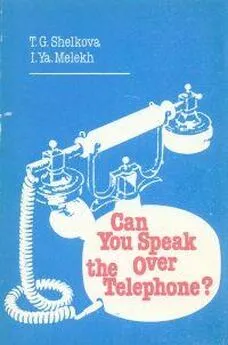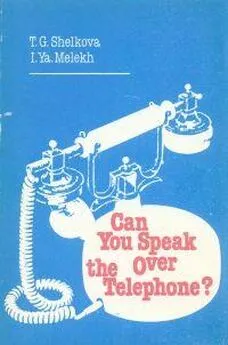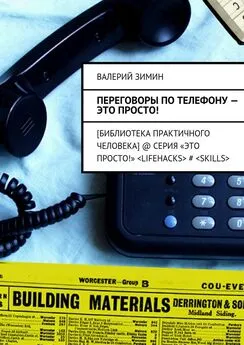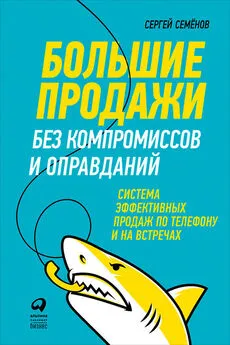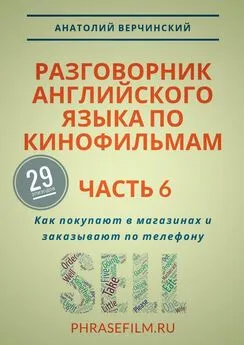Т. Шелкова - Как вести беседу по телефону
- Название:Как вести беседу по телефону
- Автор:
- Жанр:
- Издательство:Высшая школа
- Год:1989
- Город:М.
- ISBN:5-06-001624-2
- Рейтинг:
- Избранное:Добавить в избранное
-
Отзывы:
-
Ваша оценка:
Т. Шелкова - Как вести беседу по телефону краткое содержание
Ведение разговора по телефону на иностранном языке требует от обучающегося определенных навыков понимания, восприятия и удержания в памяти услышанного, а также незамедлительной словесной реакции на услышанное. Недостаточное развитие этих навыков является препятствием к тому, чтобы хорошо и уверенно говорить по телефону.
Пособие ставит своей целью помочь учащимся овладеть навыками беседы по телефону, пользоваться общепринятой терминологией.
Во второе издание (1-е — 1980 г.) внесены исправления редакционного характера.
Для лиц, самостоятельно совершенствующих свои знания английского языка.
Как вести беседу по телефону - читать онлайн бесплатно полную версию (весь текст целиком)
Интервал:
Закладка:
Mr Marsh: Well it’ll take us about two days to finish off the outstanding work [29] the outstanding work : work that has not yet been completed. Contrast the frequent use of “outstanding” to imply “of outstanding merit, qualities”, etc., as in “He is an outstanding man in every way”, “She has done some outstanding work at school”.
in the plating and polishing shops [30] the plating and polishing shops плакировочный и полировочный цехи
, and then you can have a free hand [31] then you can have a free hand : the sense is that there will be complete freedom from any hindrance: the “hands” of the workmen will be “free”.
to begin your operations. How does that suit you?
Mr Weston: Two days. That brings us to Thursday morning [32] That brings us to Thursday morning : note that idiomatic use of “bring” in such sentences as “That brings us to the next item to be discussed”.
, doesn’t it?
Mr Marsh: Thursday, yes.
Mr Weston: And I did understand you to say we could continue working at week-ends.
Mr Marsh: Yes, that’s right.
Mr Weston: Well in that case Thursday morning will suit us very well. I’ll put it in hand [33] put it in hand : give instructions to have the job started, e.g. “I’ve got the job in hand”, which means that the job is either being done, or is about to be started.
straight away.
Mr Marsh: Good.
Mr Weston: Now there is one other matter that I’d like to discuss breifly with you if you can spare the time. I’m not keeping you from anything [34] I’m not keeping you from anything : the meaning here is “I’m not preventing you from doing anything else (by talking to you)”.
, am I?
Mr Marsh: No, I do have [35] I do have : note the use of “do” here, making the verb emphatic. The effect of the emphasis is softened, however, by the following clause beginning with but.
a meeting in about half an hour, but I’m at your disposal [36] at your disposal : prepared to carry on the conversation. A bit of business phraseology.
until then, so please carry on [37] carry on : continue. Contrast the colloquial use to mean “talk too much”, “make lengthy and tedious assertions”, as in “John is a nice chap, but he does carry on about his health”.
, Mr Weston.
Mr Weston: Well, this is a point which concerns the outlet duct [38] outlet duct выходная труба
for the main ventilator.
Mr Marsh: Ah, yes. You asked to be sent the final plans, didn’t you? Did you get those?
Mr Weston: Yes, thanks. Your secretary sent them on to me. Now I see from the plans that you intend the duct to be placed alongside an existing chimney. Do you recall that?
Mr Marsh: Mm. That’s right.
Mr Weston: Well, what I’d like to know is whether the chimney’s strong enough to support the duct, or whether we shall have to construct independent supports. Now unfortunately, at the time of our survey, we didn’t think to inspect [39] think to inspect : more usually one would expect to find “think of inspecting”, but “think” may be followed by “to” plus the infinitive form of the verb instead of “of plus present participle, as in “I didn’t think to tell him” vs. “I didn’t think of telling him”.
the chimney.
Mr Marsh: No, of course, because at that stage we still hadn’t decided exactly where the duct was to go.
Mr Weston: Quite. So can you give me any idea of the strength of the chimney? You see, if we can use it as a support and bolt the duct brackets directly to it, this’ll mean a simpler job and it should also save a certain amount of time.
Mr Marsh: And it’ll be cheaper, too.
Mr Weston: Yes, quite a bit cheaper, in fact.
Mr Marsh: Mm. Well, all I can tell you at the moment is that the chimney was only built a couple of years ago, and is in good structural condition. What I can’t tell you, with any degree of certainty, is whether it’ll stand up to the kind of stress you’re proposing to put on it. As far as I can remember it’s a pretty strong job, so it should be all right.
Mr Weston: Yes. Well, it looks quite strong on our plans, but I can’t really tell, because they’re not sufficiently detailed.
Mr Marsh: No. Well, look, Mr Weston [40] look, Mr Weston : note this rather informal use of the imperative ‘look” as a signal that the speaker wishes to call attention to a proposition or statement he is about to make.
, I think we’d better not take any risks over this. I’ll call in a building expert and get him to examine the chimney, and perhaps you’ll be good enough to send me brief details of the loadings [41] loadings нагрузка
involved and the kind of brackets you’re thinking of using and so on. And I’ll put them in front of him and see what he thinks.
Mr Weston: Yes, I can get that in the post this evening.
Mr Marsh: You can? Fine [42] Fine : an informal exclamation of approval or agreement
.
Mr Weston: Well, that answers my question, Mr Marsh. Thank you very much.
Mr Marsh: Not at all [43] Not at all : one of the very few ways in English of replying to someone who has just said ‘Thank you”. For some people it has faintly comic overtones, and these are stronger with the comparable formula “Don’t mention it”. Normally, no reply to “Thank you” is absolutely necessary, but many people feel happier if they say something like ‘That’s all right”, “Pleased to help”, “Glad to be of assistance”, etc.
. And thank you for letting me know about the report so quickly. I’ll get things moving [44] get things moving : an informal way of saying “order work to start”
here, and we’ll expect your men to start work on Thursday morning.
Mr Weston: Yes, they’ll be there. Good-bye, Mr Marsh, I’ll be in touch again when the work’s started.
Mr Marsh: Bye, Mr Weston.
Mr Hopkinson: Hello. Mr Hopkinson speaking.
Mr Stock: Hello, Tom. Stock here.
Mr Hopkinson: You are just the man I wanted to speak to.
Mr Stock: Well, here I am. What’s it all about, then?
Mr Hopkinson: Well, you know that emergency delivery to Stockholm we were talking about the other day?
Mr Stock: Yes — you mean the “one they wanted delivered by the 25th? Mr Hopkinson: Yes, that’s the one. They’ve been on the telex about it to us only this morning, and now they say they must have it by the beginning of next week. I don’t know. What with that and this [45] what with that and this : because of that and this
big French order we’ve got coming up, I’ve been up to my ears in it [46] up to my ears in it : overloaded with work
.
Mr Stock: I see. Then we’d better get it off pretty soon, hadn’t we?
Mr Hopkinson: Yes, they’re counting on us.
Mr Stock: That’s right. I know old Gustavsson pretty well, actually, and I shouldn’t like to let him down either.
Mr Hopkinson: We’ll have to think of something, then, shan’t we? What’s old Gustavsson like, by the way?
Mr Stock: Bit difficult to describe, actually. Round fortyish [47] round fortyish : around forty years old
and a little bit heavy-going [48] a little bit heavy-going : rather too serious or pompous
perhaps. Got his head screwed on the right way [49] got his head screwed on the right way : clever, intelligent
, though.
Mr Hopkinson: That was my impression too, actually.
Mr Stock: Anyway, to get back to this delivery job, is there anything in particular that’s holding us up? Haven’t we got all the things we want on hand [50] on hand : available
?
Mr Hopkinson: No, it isn’t that so much. We’re a bit short-handed [51] a bit short-handed : short of staff/workers
on the packing side [52] on the packing side : in the packing department
, you see. They’ve all been working like the clappers [53] like the clappers : very quickly
on this French job, and haven’t got round to [54] haven’t got round to : haven’t managed to do/begin
this other lot yet.
Mr Stock: Let’s see. It’s Friday tomorrow, isn’t it? That makes it a bit tricky [55] a bit tricky : rather difficult
.
Mr Hopkinson: Look, I’ve been thinking. What about offering the boys in despatch a spot of [56] a spot of : a little
overtime over the week-end? We can bung [57] bung : put, throw
the whole lot into one lorry and get it straight off to Hull. Should be on the quayside by Monday morning.
Mr Stock: Yes, of course that’s the answer. Should’ve thought of that before. Well, that’s that one solved then. Better be getting back, I suppose. Will you tell Fred, or shall I?
Mr Hopkinson: Well, I’m seeing him this afternoon in any case so I’ll see to it, if you like, Peter.
Mr Stock: Would you? That’s splendid. Look, I must push off now. I’m seeing that chap from Benson’s at two-thirty.
Mr Hopkinson: Yes, don’t you worry. I’ll see that’s all laid on… [58] all laid on : all arranged
. Bye.
Mr Stock: Bye.
I. Define the meaning of these words and phrases. Make up sentences using them.
surveyor, quick work, subsidence, to hold things up, on account of smth., in writing, to go ahead with arrangements, the outstanding work, to have a free hand, to put it in hand, to be at one’s disposal, to carry on, with any degree of certainty, to stand up to the stress, to get smth. in the post, to get things moving, emergency delivery, to be on the telex, what with that and this, to be up to one’s ears in work, to get smth. off, to count on smb., to let smb. down, round fortyish, heavy-going, to get one’s head screwed on the right way, to hold smb. up, to get things on hand, to be a bit short-handed on smth., to work like the clappers, to make it tricky, to bung the whole lot into one lorry, to push off, all laid on
II. Rephrase these sentences.
1. You’ve taken a load off my mind. 2. That brings us to Thursday morning. 3. I’ll put it in hand straight away. 4. I’m not keeping you from anything? 5. I’ll call in a building expert and get him to examine the chimney. 6. I can get that in the post this evening. 7. I’ll get things moving here. 8. You mean the one they wanted delivered by the 25th. 9. They’ve been on the telex about it to us this morning. 10. What with that and this big French order we’ve got coming up, I’ve been up to my ears in it. 11. Then we’d better get it off pretty soon. 12. Haven’t we got all the things we want on hand? 13. We’re a bit short-handed on the packing-side. 14. What about offering the boys in despatch a spot of overtime over the week-end?
III. Reproduce the telephone conversations as close to the text as possible.
Читать дальшеИнтервал:
Закладка:
